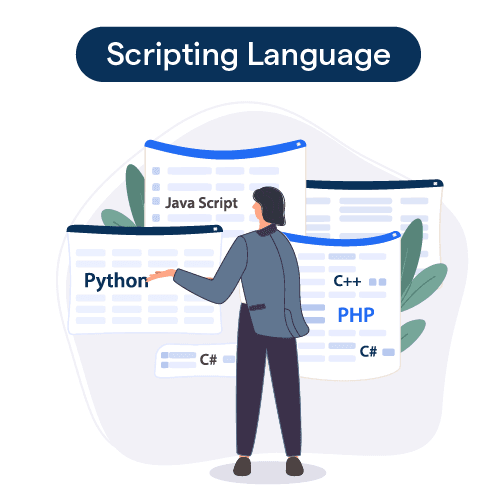What is a Scripting Language?
A scripting language is a programming language used to automate and execute tasks. Scripting languages are usually interpreted rather than compiled.
They allow writing programs using everyday language in a simple syntax.
For example, JavaScript is a popular scripting language used to add interactivity to web pages. JavaScript code is embedded into HTML and interpreted by the browser.
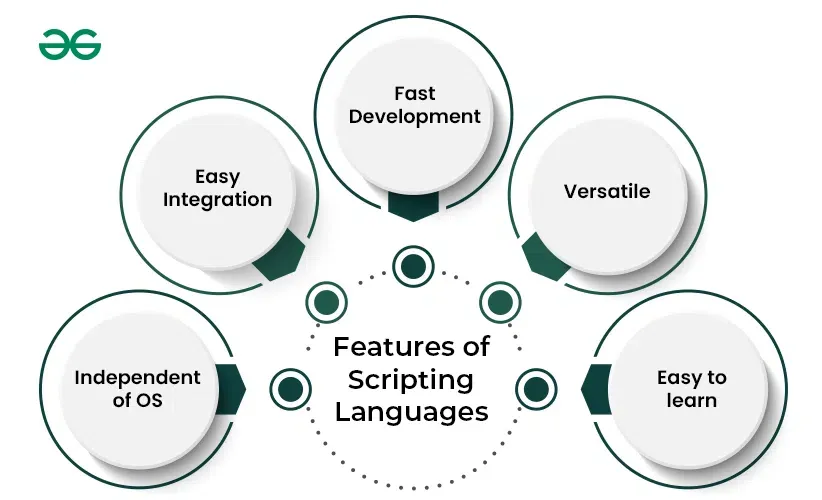
Other common scripting languages include Python, Ruby, PHP, and Bash.
Scripting languages are designed to be lightweight and easy to use. They often don't require strict formatting or variable declaration rules like compiled languages.
Scripts are used for tasks like processing text data, implementing app logic, connecting web services, and automating system administration.
Scripting provides a faster and more flexible way to write programs compared to traditional software development. Scripts can glue various components together and perform repetitive tasks, reducing coding effort.
They are popular with programmers for writing quick one-off programs and prototyping applications.
What are the Benefits of Scripting Languages?
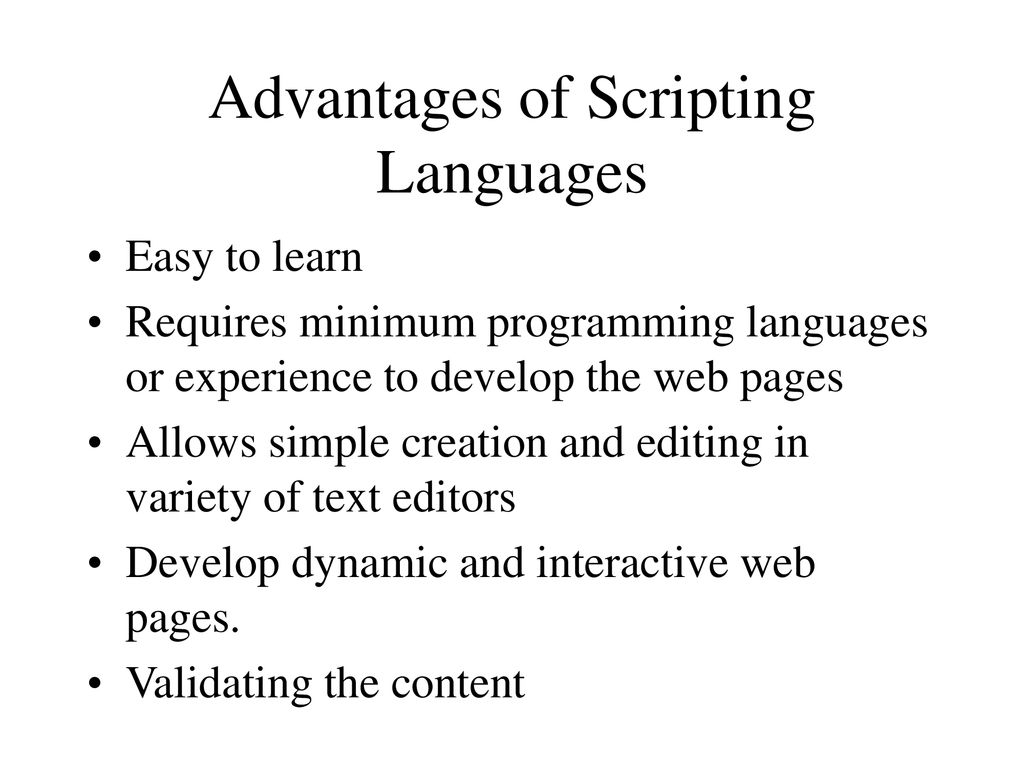
Now that you know the basic, let’s dive into the ‘WHY’. Here’s a detailed look at the benefits of scripting languages.
Ease of Learning
Scripting languages are widely recognized for their accessibility. Designed with simplicity in mind, they are more straightforward to grasp than many traditional programming languages.
That makes them an excellent starting point for programming newcomers.
Rapid Development
One of the strengths of scripting languages is the speed at which developers can write, test, and deploy code.
Without the need for time-consuming compilation processes, changes can be immediately implemented and tested, significantly reducing development time.
Task Automation
Say goodbye to tedious, repetitive tasks. Scripting languages excel in automating these chores, freeing up valuable time that can be better spent on more complex tasks.
From data extraction to system configuration, scripting languages can automate it all.
Flexibility
Scripting languages offer flexible options in the development process.
They can be used in various ways such as embedding within HTML (HyperText Markup Language) to enhance website functionality or within software applications to automate specific functionalities.
Extensive Support and Communities
Last but not least, scripting languages often come backed by robust communities.
From comprehensive documentation, online forums to dedicated support channels, these resources can provide invaluable assistance, whether you're troubleshooting, learning, or seeking to expand your skills.
Differences between Scripting Language and Programming Language
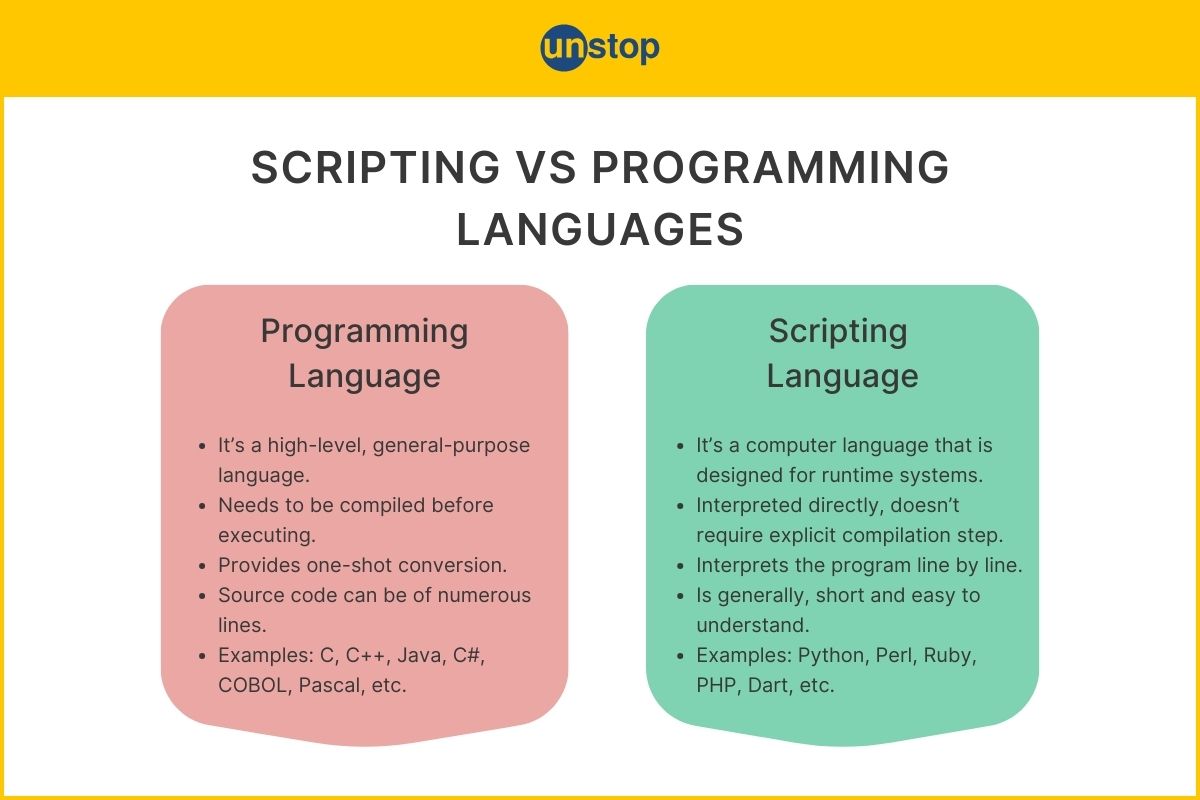
You might be wondering, what sets scripting languages apart from traditional programming languages?
Well, let's break it down for you. The primary difference lies in how they are executed.
- Concept of Scripting Languages: Scripting languages are a subset of programming languages that are interpreted rather than compiled and are often used for automating repetitive tasks or adding functionality to applications.
- Concept of Programming Languages: Contrary to scripting languages, programming languages consist of a set of instructions that are compiled into a machine-executable format before being executed.
These languages are used to construct complex, standalone software applications.
- Compilation and Execution Process: Scripting languages are typically executed line by line at run time by an interpreter, making them slower.
In contrast, programming languages are first converted into machine code by a compiler, providing faster execution.
- Use Cases of Scripting vs. Programming Languages: Scripting languages find good use in specific contexts, like web development (JavaScript), task automation (Shell scripting), etc.
Programming languages, however, are used for building robust software applications or system software (like C++ or Java).
- Error Handling and Debugging: In scripting languages, errors are usually detected at runtime as the code is interpreted line by line.
But in programming languages, many errors are caught during the compilation stage, which can streamline debugging.
- Ease of Learning and Use: Typically, scripting languages like Python, PHP are considered easier to learn and write due to their simpler syntax and less strict rules.
Programming languages, on the other hand, may require more formal understanding of programming concepts, but offer more control and efficiency.
Types of Scripting Languages
Scripting languages serve unique purposes, here’s a detailed look at the various types of scripting languages.
- Shell Scripting Languages: Shell scripting languages, such as Bash and PowerShell, are commonly used for automating tasks in Unix and Windows environments respectively.
They are particularly adept at file manipulation and command execution.
- Web-Based Scripting Languages: These are languages used predominantly in web development for client-side or server-side operation. JavaScript, PHP, and Ruby fall under this category and make implementing complex user interactions or managing databases a breeze.
- General-Purpose Scripting Languages: Python and Perl are considered general-purpose scripting languages because of their flexibility.
Developers can use them in many contexts, from web development and data manipulation to scientific computing and artificial intelligence.
- Application-Specific Scripting Languages: These are scripting languages designed to interact with a specific application, like JavaScript for web browsers or Visual Basic for Applications (VBA) in MS Office products.
- System Scripting Languages: Scripts of these languages, like Python or JavaScript in Node.js environment, can interact with the system on a low level.
They can automate system task, manipulate files, and even handle network communication.
Use Cases of Scripting Languages
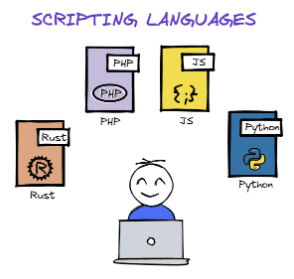
Scripting languages have a wide range of applications, both on the server-side and client-side. Here are a few use cases where scripting languages shine:
- Automated Processes: Scripting languages shine when it comes to automating repetitive tasks. From file manipulation, generating reports, scheduling system tasks to network scanning, these languages can automate them all, saving you plenty of valuable time.
- Web Development: In the world of web development, scripting languages are the ace up the sleeve. They charge the backend systems, power the server-side scripting, and even run the client-side scripting for smooth interaction between users and web applications.
- Data Manipulation: If you're dealing with vast data sets and need to perform analysis or manipulation, scripting languages can be your trusty assistant.
By writing a script, you can handle data extraction, cleaning, transformation, and even visualization with ease.
- System Management: Managing a system just got easier! Admin tasks like setting up environments, checking system health, diagnosing issues, or configuring new deployments can be seamlessly performed with scripts, enhancing system efficiency.
- Prototyping & Testing: Scripting languages come in handy when you want to quickly whip up a prototype or test a specific functionality. They expedite the cycle of testing.
Frequently Asked Questions (FAQs)
What is a scripting language?
A scripting language is a specialized programming language designed to automate tasks.
Often used to create small programs for specific functions, it streamlines processes with its unique capabilities.
What are some popular scripting languages?
Popular scripting languages include Python, Ruby, Shell scripting, JavaScript, and PHP.
Each language possesses its own strengths and weaknesses, making it important to choose the appropriate one based on individual requirements.
What are the advantages of using scripting languages?
Scripting languages are generally considered more accessible and easier to learn compared to traditional programming languages.
Additionally, they facilitate faster development since code snippets can be written, tested, and modified without the need for compilation.
What are the disadvantages of using scripting languages?
One notable disadvantage of using scripting languages is their typically slower performance compared to compiled languages.
Furthermore, they may not be ideally suited for managing larger, more complex projects.
Where are scripting languages used?
Scripting languages are deployed in a wide array of settings, encompassing web development, data analysis, system administration, scientific computing, and machine learning applications.
Their versatility ensures their presence in numerous industries and situations.
